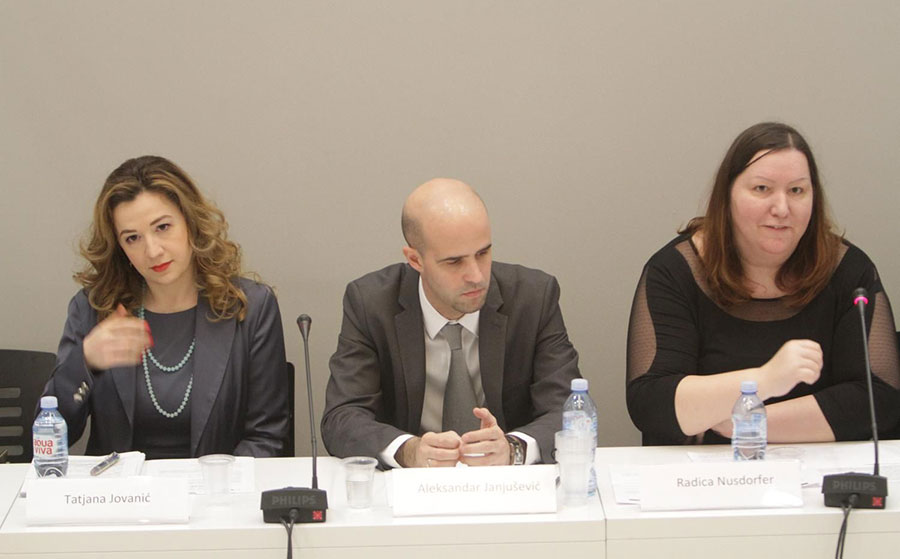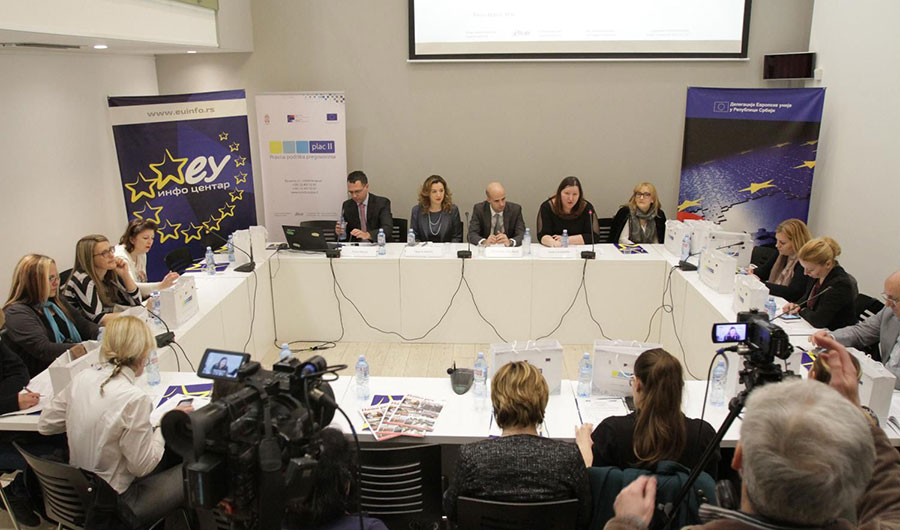In order to fully align with EU legislation in the area of financial services, covered by negotiating chapter 9, Serbia needs to align the national legislation with the EU to better protect consumers as well as bank, insurance and payment operations services users.
This was one of the conclusions made by participants in the media briefing “On the path to the EU – Chapter 9” organised jointly by the EU Info Centre and PLAC II project and held at the EU Info Centre in Belgrade.
Chapter 9 is one of three chapters Serbia should open in June (along with chapter 13 – fisheries, and chapter 33 – financial and budgetary provisions).
Harmonization with EU standards includes making amendments to both the law on the capital market and on investment funds as well as the adoption of a brand new law on alternative investment funds, the participants in the briefing concluded.
Chapter 9 deals with banks, the capital market, investment funds and the financial system infrastructure, i.e. the sector that is becoming increasingly interconnected, internationalised and digitised.
The goals of chapter 9-related legislation concern financial stability, consumer protection and the creation of a single financial market in Europe.
Chapter 9 deals with complex issues which remain largely unnoticed by both policy creators and the media, said Head of European Integration sector at the EU Delegation to Serbia Radica Nusdorfer, adding that said chapter aims to increase security and efficiency of the financial system for the benefit of citizens, businesspeople and investors.

FoNet
Opening a chapter does not mean that the job is done, especially not when it comes to transposition of EU acquis into national legislation.
Commenting on the MIFID II Directive (Markets in Financial Instruments Directive) PLAC II project expert Pierre Matek said that the Directive was part of EU’s continued response to 2008 financial crisis which revealed numerous deficiencies of the capital market.
When it comes to consumer protection, the MIFID II Directive sets down rules for sales management and the target market, activities of independent investment advisors, portfolio management services, structured deposits and information about financial instruments, the so-called “packaged” products.
MIFID II Directive accompanying regulation – MIFIR – will be the most challenging part of the Directive implementation, said Matek, a Croatian expert in capital markets and a PLAC II project expert. In a bank-centric market like the one in Serbia, product management will be the biggest challenge to overcome.
MIFIR Regulation allows ESMA, European Securities and Markets Authority, to either temporarily or permanently forbid marketing, distribution and sales of certain financial instruments or to prohibit certain practices in order to protect investors, the integrity or the financial market, Matek noted.
By implementing the requirements arising from chapter 9, Matek said, we create conditions to preserve stability, protect consumers and ensure Serbia’s successful EU integration.
“Product management will be mandatory, meaning that each financial institution, prior to offering a product to its clients, will have to provide explanation and details about the potential client. If you create a terribly risky and highly volatile product with a long-term investment horizon, then you will definitely not sell it to an 88-year-old grandma, investing her entire life savings. It should not have been happening thus far either, but from now on it will be outlawed,” said Pierre Matek.
Acting Assistant Director of the Minister of Finance Aleksandar Janjusevic announced that amendments to the Law on the Capital Market would be made in regard to financial instruments and protection of financial market actors.
In parallel, new law on alternative investment funds, such as entrepreneurs’ investment funds and the like currently not present in Serbia, should ensure conditions for their operation, regulate licensing procedures and their modus operandi, etc.
Head of chapter 9 negotiating team Tatjana Jovanic said that, drawing from Croatia’s and in particular Montenegro’s experience, she expected the EU to prepare 4-5 closing benchmarks for chapter 9.
According to her, the benchmarks will concern the powers of financial conglomerates, following through with Basel III, the creation of alternative investment funds framework, and a benchmark regarding insurance.
Jovanic also said that the process of EU accession would bring about liberalisation of the entire financial system, opening space for non-banking financial institutions to take root, such as savings cooperatives and crowd funding.
Tatjana Jovanic said that Serbia could expect 4-6 closing benchmarks for chapter 9. “If we look at Montenegro – and the situation there is very similar to ours – I guess the benchmarks will include financial conglomerates, following through with Basel III and the creation of a framework for alternative investment funds.”




